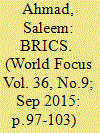| Srl | Item |
| 1 |
ID:
140627


|
|
|
|
|
| Summary/Abstract |
The leaders of the BRICS countries have demonstrated that the establishment of the BRISC bank is a direct blow to the International financial system and it has also remarkably shown the building of the new global economic order that will bring middle economic powers to the global economic affairs. Things have changed rapidly, and the BRICS bank is going to play a pivotal role in financial policies of the developing countries. Moreover, the BRICS countries have indicated to the western countries and especially to the United States of America that nothing is permanent and gone are the days of American dollar; now they have their own currency for trade and exchange among the member countries. This step clearly shows a dent on American dollar hegemony in the world and China’s Yuan is going to rise gradually at the global level. Nevertheless, the fear of China’s dominance among its members can alter the new global economic order and BRICS countries should not give the opportunity to the western countries to play a “divide and rule policy” against its members. They must have faith in each other and can resolve their problems at the bilateral level as well as multi-lateral level.
|
|
|
|
|
|
|
|
|
|
|
|
|
|
|
|
| 2 |
ID:
092084


|
|
|
|
|
| Publication |
2009.
|
| Summary/Abstract |
This article explains a shift in the way transatlantic authorities managed conflicts over the cross-border regulation of securities markets: from cooperation skewed heavily toward the preferences of U.S. officials and accepted grudgingly by European counterparts; to a Euro-American regulatory condominium characterized by close interactions among decision makers and mutual accommodation. In the final decades of the twentieth century, the asymmetric influence wielded by U.S. securities market authorities had few parallels in other regulatory areas. Why, then, did U.S. officials become more accommodating and European authorities more influential, and why did the turning point occur in 2002 and 2003, an unlikely moment for intensified transatlantic sovereignty sharing? My study shows that institutional change inside the EU recast the North Atlantic balance of regulatory leverage and thereby was the primary factor behind the reshaping of transatlantic cooperation. Internal EU regulatory centralization changed the expectations of U.S. and European firms and authorities and generated new incentives in Washington, D.C., for accommodation and closer transatlantic coordination. My explanation differs from models that, accepting U.S. financial pre-eminence as a given, attribute variance in cross-border regulatory cooperation to factors such as incentives derived from the particularities of issue areas or preferences rooted in domestic politics. While resonating with a well-established theme from the realist branch of IPE, my findings have broad theoretical significance, and open new avenues for dialogue between realists and constructivists about the social, political, and institutional foundations of power in global economic affairs. The transatlantic political process set off by financial transformation in Europe reveals contemporary sources of systemic change and raises questions about what the EU's ascendance as a global financial regulator will mean in the aftermath of the late-2000s crisis.
|
|
|
|
|
|
|
|
|
|
|
|
|
|
|
|